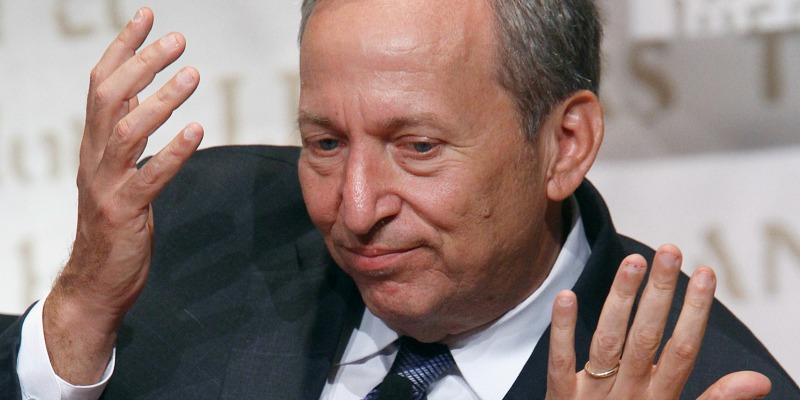But Summers’s opposition isn’t because he’s a deficit hawk or in any way opposed to government spending. No, his opposition is due to the fact that he’s afraid giving money directly to the average American—instead of his friends on Wall Street—would “risk a temporary overheat” of the economy.
Translation: people who aren’t billionaire CEOs might spend the money incorrectly.
https://mises.org/wire/larry-summers-reminds-us-federal-stimulus-mostly-exists-help-wall-street
Over the past two weeks in Washington, the battle has raged over whether or not the latest so-called stimulus bill should include direct payments to Americans. This would be the second round of direct payments, which were sent out back in April as part of a $2 trillion spending package. The first stimulus checks were $1,200 per individual or $2,400 per married couple filing jointly, plus $500 per child under seventeen.
In mid-December, Congress approved a smaller second payment at $600 per adult and $600 for children. But President Trump, ever the populist, refused to sign off on that deal and instead demanded a larger payment of $2000. Recognizing which way the political wind is blowing, the Democrats approved the increase in the House, but the effort has stalled in the Senate under GOP leadership.
One would think this issue would be a slam dunk for most allies of the Democratic Party, but the old Wall Street antipopulist wing of the Clinton-Obama axis is leading a small revolt against the idea of giving stimulus to anyone but Wall Street bankers and bond brokers.
There is, for example, Larry Summers.
Summers is a former secretary of the Treasury (under Clinton), a former World Bank technocrat, and an advisor to both Obama and Biden. He was also formerly the president of Harvard, where he now teaches.
When Summer speaks, it’s a safe bet that his opinions well reflect those of the technocracy, Wall Street, and the wealthy “elites” of America’s ruling class.
He’s also a self-described Keynesian economist, and all this means is that Summers is an enthusiastic supporter of bailouts, easy money, and endless government spending.
Whether following the 2008 financial crisis, or during the covid panic of 2020, Summers has supported doling out cheap and free money to Wall Street firms and huge banks in seemingly endless amounts. He has rarely met a corporate bailout he didn’t like.
But when it comes to giving money directly to the taxpayers, well, that’s where he draws the line.
Summers made this clear in an interview with Bloomberglast week, declaring he’s “not even sure [he’s] so enthusiastic about the $600 checks.” He’s definitely not excited about $2,000 checks, which he described as “a pretty serious mistake.”1
But Summers’s opposition isn’t because he’s a deficit hawk or in any way opposed to government spending. No, his opposition is due to the fact that he’s afraid giving money directly to the average American—instead of his friends on Wall Street—would “risk a temporary overheat” of the economy.
Translation: people who aren’t billionaire CEOs might spend the money incorrectly.
This is not surprising, as it is similar to the position Summers took during the Great Recession. In those days, Summers steadfastly opposed any financial relief for foreclosing homeowners, but “[a]t the same time, he supported every bailout of financial firms.”
Those bailouts, by the way, continue today. While many defenders of bailouts claim the bailout money was distributed merely as loans and was thus paid back by all those wonderful bankers, this ignores some key facts. Investment firms that invested in mortgage-backed securities (MBS) in the days following the 2008 financial crises were directly subsidized and bailed out by the Fed, which purchased more than 2 trillion dollars’ worth of MBS. These assets remain on the Fed’s books today, which means MBS investors essentially received free money for what would have quickly become near-worthless investments. This was done in order to ensure the prices of these assets did not collapse as they should have.
The truth is that when it comes to bailing out Wall Street, those who support bailouts hardly limit themselves to loans.
Are Ordinary Americans Doing Fine?
Summers further asserts that there is no shortage of demand among Americans. That is, the problem isn’t a lack of funds among Americans, but the fact that people aren’t permitted to spend because “they can’t take a flight or go to a restaurant.” People have money, he insists. They just can’t do much with it. Thus, he concludes, “I don’t necessarily think that the priority should be on promoting consumer spending beyond where we are now.”
Many Americans, however, are likely to disagree. Food banks report that demand “has greatly intensified since March,” especially among workers in the food service industry and among employees at “mom and pop” stores. USA Today reports more than 6 million households missed their rent or mortgage payments in September.
Studies also suggest that at least among a segment of the population—i.e., the lower-income or unemployed segment—stimulus money is quickly spent on necessities like food and rent, and catching up on bills.
Summers is right, of course, that some people just sat on their stimulus money. According to a study from Northwestern University, people with more than $3,000 in their checking accounts did not rush out and spend their first-round stimulus checks. Other data suggests many people used the money to pay down debts. These higher-income stimulus recipients are also likely the driving force behind the fact that the US savings rate is at historic highs right now.
But the fact many are “hoarding” stimulus money only further disproves Summers’s analysis. If it is the case that a sizable number of Americans are simply saving their stimulus checks or paying down debt, there’s no risk of any short term “overheating” of the economy. Both hoarding and paying down debt are deflationary acts, so by Summers’s Keynesian standards, it follows that opposing stimulus checks to ordinary people isn’t really something we need to worry about after all.
Now, I don’t mention any of this because I think stimulus checks of any size are a good idea. Bailouts and government stimulus of all types are extremely damaging economically. Whether directed at billionaires or at mechanics, stimulus payments and programs—especially of the type funded by newly printed money—create bubbles and result in wealth destruction. We’ve examined this countless times here on mises.org.
But it is nonetheless important to note that the mainstream, establishment Keynesian view is one closely wedded to the idea that it’s billionaires and investment bankers who deserve bailouts and not ordinary people. People like Summers would have us believe that it’s fiscally irresponsible to give money away to regular folks but printing up $7 trillion in new money in order to buy up government and corporate debt all makes perfect sense. This first started to become undeniably clear in the days following the 2008 financial crisis. But now it’s become more apparent than ever.
And it must never be forgotten that the severity of the current crisis was made far worse by policies that Summers and his fellows supported: lockdowns of businesses, stay-at-home orders, and monetary policies that favor wealthy borrowers over middle-class savers. This crisis is largely of their making. But should Summers’s victims get a bailout? Well, that’s just crazy talk in his view.
For people who remain mystified as to how populists like Donald Trump get elected, they need not look much further than this.
- 1. Thomas Friedman, a New York Times columnist who is married to an heiress and who is another reliable old partisan of the ruling class, agrees with Summers. He writes that a “$2000 untargeted giveaway, in many cases to people who don’t need the help, is crazy.” Thomas L. Friedman (@tomfriedman), “We need to take care of Americans hurting because of Covid-19. We need to buttress our cities that are running out of money. We need to invest in infrastructure. But a $2000 untargeted giveaway, in many cases to people who don’t need the help, is crazy. Can we stop and think?,” Twitter, Dec. 30, 2020.
Author:
Contact Ryan McMaken
Ryan McMaken (@ryanmcmaken) is a senior editor at the Mises Institute. Send him your article submissions for the Mises Wire and The Austrian, but read article guidelines first. Ryan has degrees in economics and political science from the University of Colorado and was a housing economist for the State of Colorado. He is the author of Commie Cowboys: The Bourgeoisie and the Nation-State in the Western Genre.
Be seeing you



